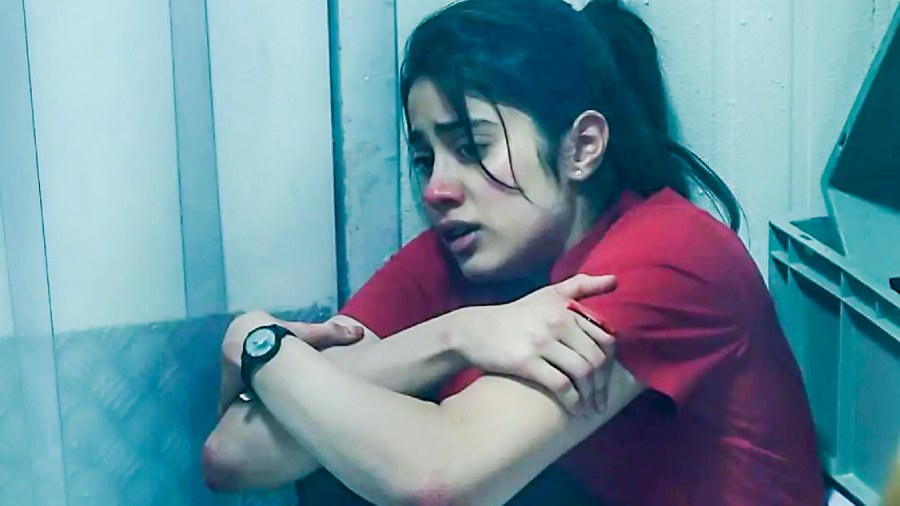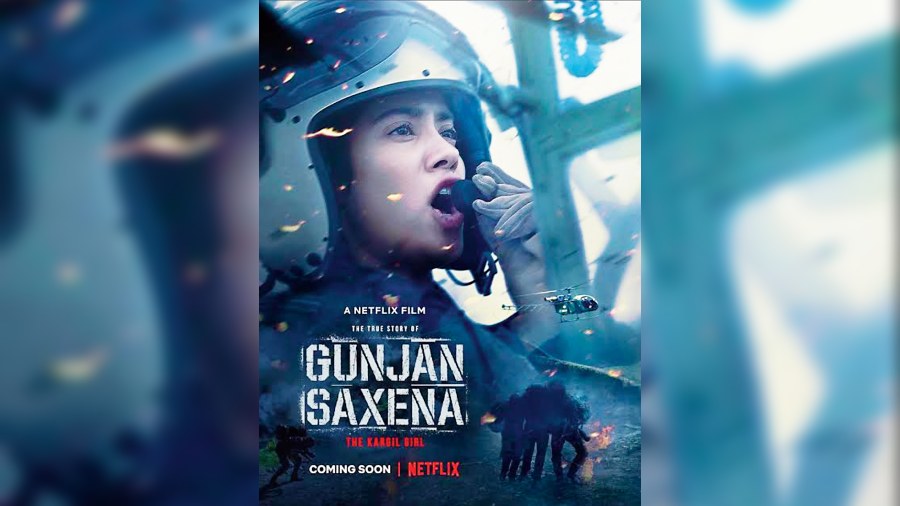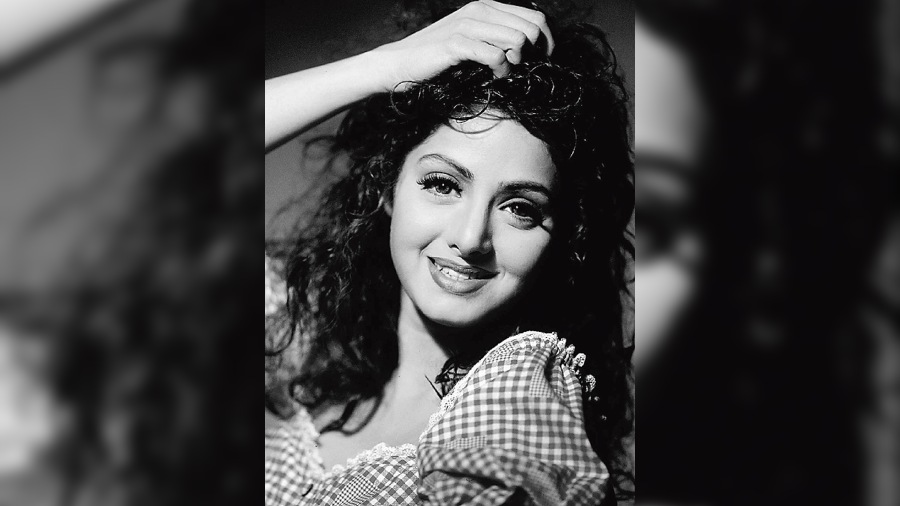When she made her acting debut four years ago, Janhvi Kapoor came in with a lot of weight, figuratively. First, was the grief of having lost her mother, actress Sridevi, less than six months before Dhadak hit movie theatres. Janhvi, who was just 21 at the time, also had to contend with the huge expectations that came with being Sridevi’s daughter, as well as a life that was in the public eye even before she became a public figure.
Dhadak earned her equal amounts of praise and criticism, but the challenging part that Janhvi seemed to have aced on debut, showed us that she had it in her to do much more. That happened two years later when Janhvi forced us to sit up and take notice of her silent but steely performance as real-life Kargil shero Gunjan Saxena in the eponymously titled film. “She’s very endearing in the role, and by the time Gunjan goes into combat, we see Janhvi’s performance evolving into one more confident than in the initial stages of the film. Janhvi is, undoubtedly, an inspired choice for the part,” is how The Telegraph’s review of Janhvi’s performance read.
Post that, even as her contemporaries concentrated on angling for big-budget projects opposite big names, Janhvi quietly started figuring out her niche, one film at a time. Roohi, a horror-comedy, didn’t leave an impact, but it did provide a peek into her vastly expanded skill set as an actor.
Since then, Janhvi has hit a home run with two films that rest wholly on her young shoulders. Both Good Luck Jerry and Mili, releasing within a few months of each other, have seen well-told and rooted small-town stories, with Janhvi holding centrestage. While Good Luck Jerry had her in the part of a resourceful girl who gets sucked into the world of smuggling drugs and an eventual cat-and-mouse game, Mili has undoubtedly been the showreel of her career so far, with the survival thriller enabling Janhvi to showcase myriad emotions.
Over a freewheeling chat, The Telegraph visited the inner world of Janhvi Kapoor — what drives her, why she has had to work doubly hard for audience acceptance and what part of her mother’s legacy she aspires to take forward.
At a time when Hindi cinema is in the doldrums, both creatively and commercially, Mili is a well-made film that has come in for praise. What’s the predominant tenor of the feedback like?
A lot of people picked up on some of the stuff in the freezer segment, which I didn’t think audiences would realise so easily. Like the part where I was fixing my broken leg or crying in the cold... those are the scenes which required me to bring out a million emotions.
As an actor, when you do such scenes, you look back and feel that you have given it your all, but you don’t know how it will finally translate on camera. Sometimes, the audience finds another scene to praise (smiles).
This is one film where I feel that all of the things that I threw myself into and worked hard on were picked up by the audience. One comment that has made me the happiest throughout is that a lot of people have been saying that mom (Sridevi) would have been really proud seeing this performance. This compliment has come more for this film than for any other film I have done so far. That makes me so happy (smiles).

One hears that you didn’t want to do Mili initially. Was that because you started your career with a remake (Dhadak) and your last film (Good Luck Jerry) was also a remake?
Yes, that’s right. I have to organically deal with comparisons with my mom and if you are someone who comes from a privileged background, then inevitably there is a perception created about you where people tend to hate on you a little bit. To come with that baggage and then to attempt doing a film that people have already loved in another language (Mili is a remake of the Malayalam film Helen), is tough. It (Helen) won National Awards and was made into other languages. So it’s a given that there would be comparisons.
As far as remakes go, as you mentioned, I have done it twice before and I wouldn’t say I emerged unscathed, but I did come out of those films with some amount of appreciation. I didn’t know whether I wanted to set myself up for that again.
I had made up my mind not to do the film. But then I met Mathu sir (Mathukutty Xavier, the director of both Helen and Mili) and I also saw how passionate my dad (producer Boney Kapoor) was about this subject. I didn’t want to say ‘no’ to an opportunity where I knew I could do quite a bit as an actor. It’s then that I realised that an actor shouldn’t really preoccupy themselves with external reasons. Doing Mili was a creative call for me. Having said that, I don’t think I will do remakes in a while.
Right from Gunjan Saxena to now, you have played women who are the centrepiece of the film and yet vulnerable and show their true mettle when they are pushed... they are often underdogs. Are you naturally drawn towards such characters, or is picking people like this to play a creative call that showcases your acting abilities to the fullest?
I think it’s a little bit of both. After Gunjan (Saxena), people started associating me with the kind of girl who is vulnerable and doesn’t know her way and is a complete underdog. I got a lot of similar offers after that film. And then after (Good Luck) Jerry, I got offered parts which had a little bit of masti and canniness.
I think that directors offer parts only based on what you have done before. Very rarely is an actor gifted an opportunity where the director comes with an agenda of, ‘We have never seen you do something like this and we have a role for you’. So I take on the onus of surprising people and taking on parts that allow me to push myself and do different things.
But like you said, I have also organically navigated towards these roles, parts where I have been an underdog or a slightly sensitive character. I like doing characters who are figuring out what to do, what not to do. And that’s the stage I am at in my life also. At the end of the day, I guess art imitates life (smiles).

You come from a place of Bollywood privilege and the word ‘nepotism’ is always hurled at you, because of which you have to work doubly hard and prove your abilities time and again. Do the struggles of these characters mirror your own struggles in some way?
I think so. I have always kind of played the unlikely hero or the unlikely protagonist. I thought about it a lot after I did Gunjan because even Gunjan finds herself in an environment where, despite having the necessary skill set, people were ready to write her off in the environment (Indian Air Force) she was in. And I empathise with that so deeply and so personally. In so many moments I felt that the dialogues that I was saying as Gunjan were such an accurate representation of what I was feeling as Janhvi.
What I have learned from the experiences of these films, and especially Gunjan and her life, is that it’s all about putting your head down and just working. What is key is believing in yourself, putting the work in.... The journey may end up being a little longer, but hard work is what keeps me going.
Is it really easy to keep your head down and work given the constant scrutiny that’s on you and your peers?
I think it depends on each person and what happens in their journey of both life and career. For me, what works is that I am more focused on my journey than on the result of that journey. The joy and the reward for me is what happens between ‘action’ and ‘cut’ and in the preparation leading up to the shoot. The genuine reward for me is standing in front of the camera, is in living the character, is going on an outdoor (shoot) and forgetting my own life and being this completely different person who my character is. My art is my high in life.
Of course, what I am doing is to entertain the audiences and I would like them to like what I do. When my films do well, it means more opportunities as an actor and to keep doing what I love. Acting, for me, is the means to an end and that end may be an award or a box-office number or some sort of gratification. But beyond that, my reward lies in doing the job well. As long as I am getting to do that, I am good.

Is this joy of being in front of the camera something that came with your first film itself, or did you arrive at this stage gradually?
I think I realised it a little bit when my films started releasing and I understood that audiences are going to take more time — than they would with someone else — to accept me with open arms.
I always knew I would get attention, grab eyeballs and have the reach because of who my parents are. But that willingness on the part of the audience to shed the baggage of the perception they have about me would take much longer.
It has been said that the less people know of your life off screen, the easier it will be for them to buy the characters that you play on screen. I never had that luxury because audiences know enough about my life to psychoanalyse every character I play and every move I make, on screen and off it. One can’t blame them, it’s always just been there. I think I understood that fairly early and that’s helped me disassociate with some things and look at them from a slightly objective lens.
The reactions for Dhadak were divided, and even after Gunjan Saxena was praised so much, I could sense that there was still a resistance in people accepting me because of the wave of nepotism that was on at that time. That’s when I realised that it’s the process, it’s the shoot, it’s the prep that I have to start enjoying the most. Even after the fair bit of accolades that have come my way now, I don’t miss being on stage and getting an award. The only thing I remember is the fun I had at an outdoor or the high I felt performing a certain scene. That has given me the clarity to understand what I really want in life.
That feeling must be empowering...
It is both empowering and liberating. A lot of people have started looking at artistic opportunities as ‘projects’. Films are now made on excel sheets and I don’t think that’s the way to go about it... at least that’s not how I want to conduct my career, for sure. So while I do realise that reaching as many people as possible and giving them a large-than-life, commercial experience is necessary, this is not what should drive an artiste.

You, of course, have your individual career and your own journey, but what aspect of your mother’s rich legacy do you want to take forward?
The part of her legacy I would like to take forward is the deep connection that she had with the audience. It was not limited to her just dancing on screen and making audiences laugh... it was so much more personal than that. She ruled the hearts of thousands in a way in which she made them feel that she understood them. The time when she was on screen helped viewers get over the mundaneness of their lives. She dedicated her whole life to her art.
My goal and my fantasy and my ambition is to form that kind of deep connection with my audiences. I want them to trust that I can deliver for them every time I am on screen and I want to trust that they believe in me... more than I believe in myself.











